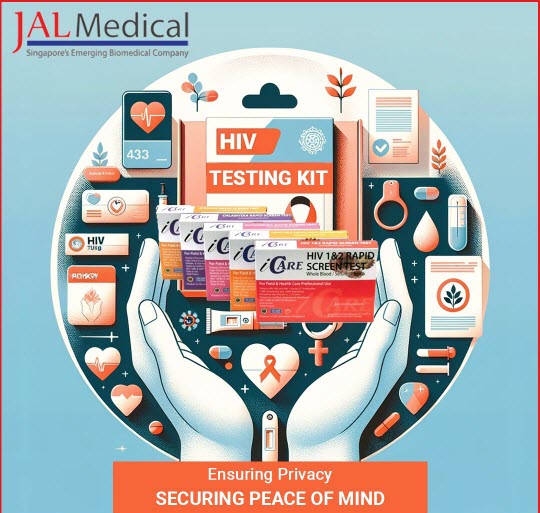Table of Contents
In Kazakhstan, as in many parts of Central Asia, the fight against HIV/AIDS faces significant challenges, particularly in remote and rural populations. Access to healthcare facilities, particularly for those in less urbanized areas, is limited. While urban centers like Almaty and Nur-Sultan (formerly Astana) benefit from advanced healthcare infrastructure, people in smaller towns and rural regions often have little access to HIV testing and care.
Decentralizing HIV testing is one of the most effective ways to bridge this gap. By leveraging HIV rapid test kits, such as the HIV rapid home test kit, Kazakhstan can reach underserved communities with fast, accurate testing solutions. These rapid tests provide a cost-effective, easy-to-use alternative to traditional testing methods, enabling people to test at home or at local community health centers without needing to travel long distances to large hospitals.
This article explores the potential of HIV testing kits in Kazakhstan, focusing on their role in decentralizing HIV testing and improving access for remote populations. We will also highlight the efforts and challenges involved in implementing these strategies in cities like Almaty, Nur-Sultan, Shymkent, Karaganda, Aktobe and Atyrau, where decentralized HIV testing programs can make a significant impact.
The Need for Decentralized HIV Testing in Kazakhstan
Kazakhstan is a large country with vast geographic distances between urban and rural areas. According to the World Health Organization (WHO), Kazakhstan has made substantial progress in addressing HIV/AIDS, but the challenges of providing comprehensive healthcare to its entire population, especially in rural areas, remain significant. In cities like Almaty and Nur-Sultan, HIV testing is relatively accessible, but in remote towns and villages, testing facilities may be few and far between.
Several factors underscore the need for decentralized HIV testing:
- Limited Healthcare Infrastructure: Rural healthcare facilities often lack the capacity to provide HIV testing, meaning people in these areas may never be tested or diagnosed.
- Long Travel Times: For individuals living far from urban centers, traveling to large hospitals for HIV testing can be time-consuming and costly. This results in many people forgoing testing altogether.
- Social Stigma: The stigma surrounding HIV/AIDS remains high in many regions, making individuals hesitant to seek testing in public healthcare settings. Testing at home using an HIV self-test kit provides privacy and anonymity, reducing barriers to getting tested.

By decentralizing HIV testing and distributing HIV rapid test kits, Kazakhstan can overcome these challenges, ensuring that more people – especially those in remote areas – have access to timely HIV diagnosis and care.
Leveraging HIV Rapid Test Kits for Decentralized Testing
HIV rapid test kits are an essential tool in the effort to decentralize HIV testing. These kits are designed to detect the presence of HIV antibodies or antigens, providing results within 20-30 minutes. There are several advantages to using rapid HIV tests, particularly in remote areas:
Accessibility and Convenience
HIV self-test kits and rapid HIV tests can be distributed widely, allowing individuals to test themselves in the comfort of their own homes. This is particularly important in rural areas like Aktobe and Atyrau, where access to healthcare facilities is limited. The ability to test at home helps remove barriers such as long travel times and the social stigma associated with seeking testing in public health centers.
Instant home HIV test kits can be particularly effective in places where the healthcare infrastructure is scarce. By ensuring that individuals in remote towns have access to these test kits, the reach of HIV testing can be greatly expanded. For example, in Karaganda, Shymkent and other smaller cities, mobile clinics or local community health workers can distribute these kits, enabling more people to participate in HIV testing.

Cost-Effectiveness
HIV test kits, especially HIV rapid home test kits, are significantly more affordable compared to traditional HIV testing methods that require laboratory facilities and trained technicians. This makes it possible for local health programs in Kazakhstan to distribute these tests more widely and at lower cost, improving accessibility to both urban and rural populations.
Fast Results for Timely Interventions
The quick turnaround time for HIV rapid test kits enables individuals to receive results within minutes, allowing them to make informed decisions about their health and seek appropriate care. Early detection of HIV can lead to better health outcomes through timely access to antiretroviral therapy (ART). In regions such as Almaty and Nur-Sultan, where healthcare infrastructure is more developed, rapid testing also helps alleviate strain on medical facilities, allowing healthcare professionals to focus on providing care to those who need it most.
Privacy and Confidentiality
Many individuals in remote areas of Kazakhstan may feel hesitant to visit healthcare centers for testing due to the fear of judgment or discrimination. Using home HIV test kits allows for greater privacy, empowering individuals to take control of their health in a confidential setting. This is particularly important in rural cities like Shymkent and Atyrau, where social stigma surrounding HIV can be a significant barrier to testing.
HIV Testing in Major Cities of Kazakhstan
Almaty: Expanding Access to HIV Testing Kits
Almaty, the largest city in Kazakhstan, is a major hub for healthcare, but there are still challenges in ensuring that HIV testing reaches all segments of the population. By distributing HIV self-test kits and expanding the availability of HIV rapid test kits, the city can continue to improve access to HIV testing. Outreach programs in Almaty aim to increase awareness and reduce the stigma associated with HIV, encouraging more people to get tested.
Shymkent and Karaganda: Bridging Gaps in Rural Healthcare
In Shymkent and Karaganda, two of Kazakhstan’s major regional centers, access to HIV testing is improving through the distribution of HIV rapid home test kits. These cities face unique challenges in reaching remote populations, but local healthcare workers are helping to bridge these gaps by distributing rapid test kits in rural areas. Mobile health units and local clinics are key to providing HIV testing services and counseling to individuals who may otherwise avoid seeking care.

Aktobe and Atyrau: Reaching the Periphery
In cities like Aktobe and Atyrau, located in the western part of Kazakhstan, HIV testing services are expanding through decentralized programs that leverage HIV rapid test kits. These areas have historically faced difficulties in accessing healthcare, but innovative strategies such as the use of rapid HIV test kits are making it possible to reach more individuals. The distribution of HIV test kits in local pharmacies and through outreach efforts is helping to ensure that people living in remote areas have the tools they need to test for HIV.
Challenges to Decentralized HIV Testing in Kazakhstan
While the potential for expanding HIV testing in remote areas of Kazakhstan is immense, several challenges remain:
- Geographical Barriers: Kazakhstan’s vast size makes it difficult to ensure that every corner of the country has access to HIV testing kits.
- Awareness and Education: In remote areas, there is often a lack of awareness about HIV self-testing kits and the importance of early diagnosis.
- Social Stigma: The stigma surrounding HIV/AIDS remains a significant barrier to widespread testing, particularly in more conservative regions.
To address these challenges, Kazakhstan must invest in public education campaigns, expand the distribution of HIV rapid test kits and work to reduce the stigma surrounding HIV. Collaboration between local health departments, NGOs and international organizations is crucial to ensure that HIV testing reaches all populations, regardless of location.
Conclusion
Decentralizing HIV testing in Kazakhstan by leveraging HIV rapid test kits is a crucial step in improving access to healthcare for remote populations. Cities like Almaty, Shymkent, Karaganda, Aktobe and Atyrau are already making strides in this direction, but continued efforts are needed to overcome challenges such as geographical barriers, social stigma and limited awareness.
With the right strategies in place, HIV self-test kits and other rapid testing solutions can play a vital role in Kazakhstan’s ongoing battle against HIV/AIDS, ensuring that all individuals, regardless of where they live, have access to the care and resources they need for a healthy future.
FAQs HIV Testing Kits
Decentralizing HIV Testing in Kazakhstan: Leveraging Rapid Test Kits to Reach Remote Populations
What is an HIV Rapid Test Kit?
An HIV Rapid Test Kit is a diagnostic tool used to detect the presence of HIV antibodies or antigens in the blood. These tests provide results within 20-30 minutes and are available for home use or at healthcare facilities.
How does a HIV Self-Test Kit work?
A HIV Self-Test Kit allows individuals to test for HIV at home. It typically involves collecting a sample of saliva or blood, applying it to the test device and waiting for results. These tests are confidential and provide a fast, convenient way to check for HIV.
Where can I get HIV rapid test kits in Kazakhstan?
HIV rapid test kits can be obtained at pharmacies, healthcare facilities and through outreach programs in cities like Almaty and Shymkent.






